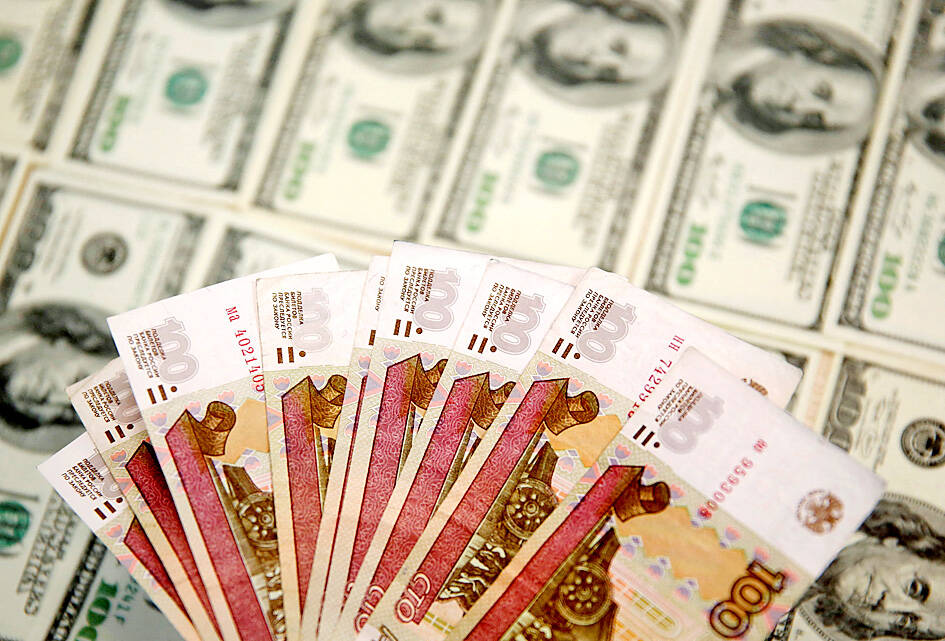The Russian ruble strengthened yesterday, remaining a long way from Friday’s three-month high against the US dollar, but still supported by local fears that new sanctions could limit investors’ ability to trade foreign currencies in Moscow.
Russian markets expect more sanctions after Russian President Vladimir Putin signed treaties annexing four Ukrainian regions last week, a move that Western governments and Kyiv have said breaches international law.
At 8:01am GMT, the ruble was 2 percent stronger against the US dollar at 57.27, some way off 53.23, its strongest mark since July 1, hit in an unstable session on Friday.

Photo: Reuters
“To say that the ruble was volatile on Friday would be an understatement,” Locko Invest head Dmitry Polevoy said. The currency was “56.90 at breakfast, 53.20 at lunch and near 58.45 at dinner.”
The ruble had gained 2.7 percent to trade at 55.20 versus the euro, after reaching a near eight-year high of 50.7250 on Friday. It had firmed 2.2 percent against the yuan to 8.156.
With the conclusion of last week’s month-end tax period, which usually sees export-focused firms convert FX revenues into rubles to pay local liabilities, Polevoy said there should be no strengthening of the level seen on Friday.
Russian stock indices were higher, but remain highly susceptible to geopolitics.
“For the Russian market, geopolitical risk remains on the agenda after Gazprom suspended its gas supplies to Italy over the weekend, in what appears to be the latest iteration of the conflict between Moscow and the EU over the supply of natural gas,” Alfa Bank said in a note.
The US dollar-denominated RTS index was up 3.5 percent to 1,077.4 points. The ruble-based MOEX Russian index was 1.4 percent higher at 1,982.1 points.
Russian manufacturing activity last month grew at its fastest rate in more than three years, driven by rises in production, new orders and client demand, a business survey showed yesterday, although Western sanctions continued to weigh on export business.

SEEKING CLARITY: Washington should not adopt measures that create uncertainties for ‘existing semiconductor investments,’ TSMC said referring to its US$165 billion in the US Taiwan Semiconductor Manufacturing Co (TSMC, 台積電) told the US that any future tariffs on Taiwanese semiconductors could reduce demand for chips and derail its pledge to increase its investment in Arizona. “New import restrictions could jeopardize current US leadership in the competitive technology industry and create uncertainties for many committed semiconductor capital projects in the US, including TSMC Arizona’s significant investment plan in Phoenix,” the chipmaker wrote in a letter to the US Department of Commerce. TSMC issued the warning in response to a solicitation for comments by the department on a possible tariff on semiconductor imports by US President Donald Trump’s

The government has launched a three-pronged strategy to attract local and international talent, aiming to position Taiwan as a new global hub following Nvidia Corp’s announcement that it has chosen Taipei as the site of its Taiwan headquarters. Nvidia cofounder and CEO Jensen Huang (黃仁勳) on Monday last week announced during his keynote speech at the Computex trade show in Taipei that the Nvidia Constellation, the company’s planned Taiwan headquarters, would be located in the Beitou-Shilin Technology Park (北投士林科技園區) in Taipei. Huang’s decision to establish a base in Taiwan is “primarily due to Taiwan’s talent pool and its strength in the semiconductor

An earnings report from semiconductor giant and artificial intelligence (AI) bellwether Nvidia Corp takes center stage for Wall Street this week, as stocks hit a speed bump of worries over US federal deficits driving up Treasury yields. US equities pulled back last week after a torrid rally, as investors turned their attention to tax and spending legislation poised to swell the US government’s US$36 trillion in debt. Long-dated US Treasury yields rose amid the fiscal worries, with the 30-year yield topping 5 percent and hitting its highest level since late 2023. Stocks were dealt another blow on Friday when US President Donald

UNCERTAINTY: Investors remain worried that trade negotiations with Washington could go poorly, given Trump’s inconsistency on tariffs in his second term, experts said The consumer confidence index this month fell for a ninth consecutive month to its lowest level in 13 months, as global trade uncertainties and tariff risks cloud Taiwan’s economic outlook, a survey released yesterday by National Central University found. The biggest decline came from the timing for stock investments, which plunged 11.82 points to 26.82, underscoring bleak investor confidence, it said. “Although the TAIEX reclaimed the 21,000-point mark after the US and China agreed to bury the hatchet for 90 days, investors remain worried that the situation would turn sour later,” said Dachrahn Wu (吳大任), director of the university’s Research Center for